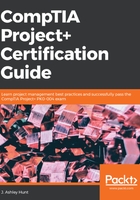
What is project management?
Project management can mean different things to different people based on your organizational dynamic and whether you are managing projects, programs, or portfolios. In general, it is the project manager's job to utilize a set of best practices, tools and techniques, and good communication and to coordinate of all the moving parts to bring the result to a successful completion. It takes a lot of skill and knowledge to manage a project effectively, which is why the majority of what we will focus on are best practices that are specific to certain categories, such as scope, time, or cost. The goal is to create an integrated plan that allows for effective coordination.
Effective project managers will have multiple skill sets in different areas.
The following isn't an exhaustive list but an overview of some of the many skills great project managers have:
- Leadership
- Communication
- Requirements-gathering
- Risk management
- Team-building
- Time management
- Effective planning skills
- Problem-solving
- Negotiation
If you are looking at that list and thinking you don't have experience in one area or another, don't worry! Even seasoned project managers are consistently working to achieve new skills in an ever-changing project landscape. For example, I'm not the greatest negotiator. I know this because I have a twenty-year-old daughter who never fails to negotiate her way out of why her credit card bills are so high! All kidding aside, for me, negotiation improvement is an aspirational skill. I have to learn and practice. That is why having a road map of best practices you can follow enables you to learn or improve upon current or future skills. This is also why certifications such as this are so important. It shows you are focused on knowledge and improvement.
Other aspects of project management have to do with the life cycles of a project, which we will cover in depth in Chapter 4, Developing a Project Charter. For now, it is important to know that the PMBOK? Guide and CompTIA view the Project + exam content as mostly predictive project management, or as it is sometimes known waterfall project management.
As a bit of a history buff, I'm always curious about where some of the labels, vocabulary, and best practices come from. You won't see this on the exam, but it's still interesting. Winston W. Royce was one of the founders of project management. He began his career working on spacecraft projects as an aeronautical engineer. In 1970, he published a very influential article called Managing the development of large software systems in which he presented several project management models, including what are now known as waterfall, iterative, and agile.
The best practices you will learn mostly fall under the category of waterfall or predictive project management, but you will see in Chapter 10, Formal Project or Phase Closure and Agile Project Management, that we cover some agile best practices, specifically a framework called Scrum. Why?
These days it is very important to be able to designate what best practices will work on your unique projects. The ability to tailor your best practices to your projects is a highly in-demand skill to acquire. In Chapter 10, Formal Project or Phase Closure and Agile Project Management, I mentioned that not everything you learn will be applicable to your day-to-day. That is why the Project Management Institute and CompTIA have determined that some knowledge of agile is necessary. That is also why you will see some questions on the Project + exam relating to Scrum as a framework rather than a project-management process.
I think it's realistic to cover what the differences are at a high level and then review agile more in depth in Chapter 10, Formal Project or Phase Closure and Agile Project Management.